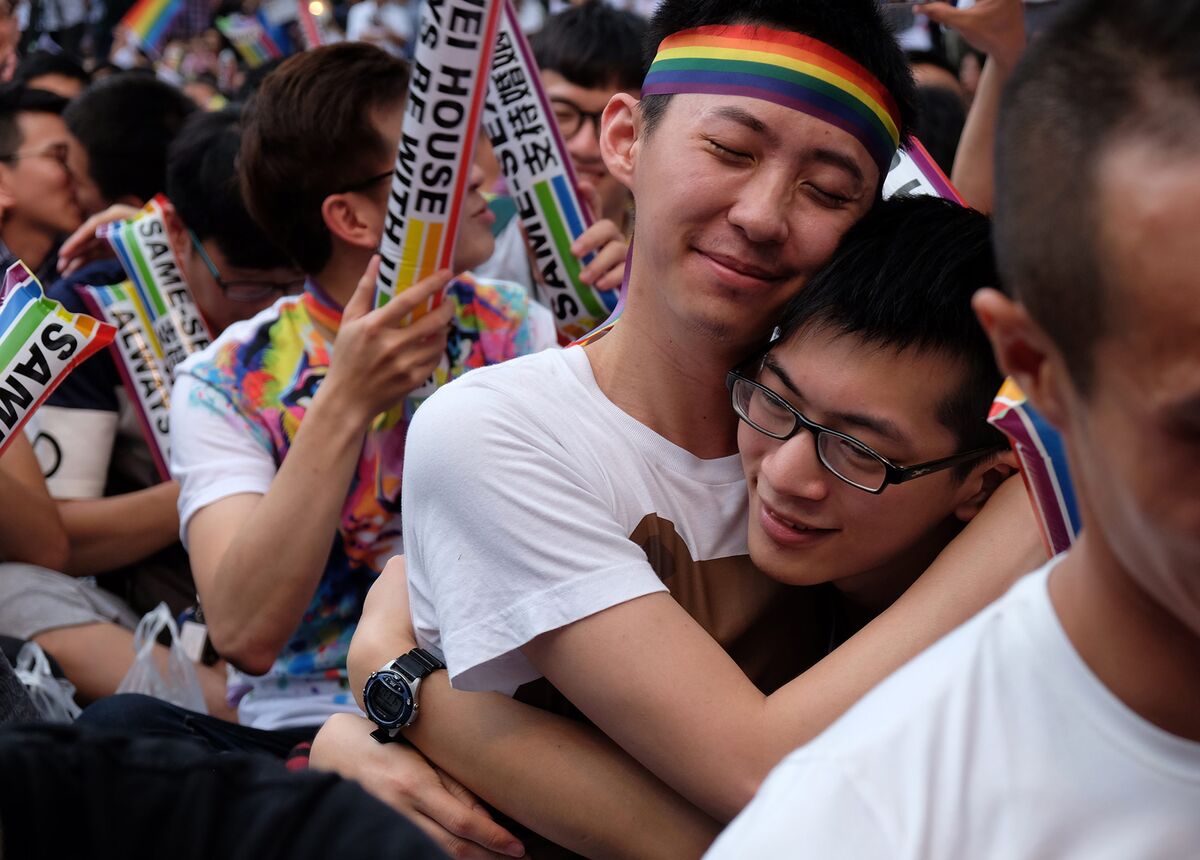
Island would become first place in Asia to guarantee right
Taiwan’s constitutional court ruled that the island’s laws must be changed to allow gay marriage, paving the way for it to become the first place in Asia to guarantee the right.
The Justices of the Constitutional Court said in a ruling Wednesday that a civil law defining marriage as a union between a man and a woman violated constitutional guarantees of equal protection. The case was brought by gay rights activist Chi Chia-wei, 58, after the Taipei city government rejected his and his long-time partner’s application to marry in 2013.
“Taiwan society has enacted true gender equality,” Chi said by phone after the decision. “It means I can die without regret.”
QuickTake Gay Rights
The court said that lawmakers must either amend the current law or enact legislation to allow gay marriage within two years. If the law wasn’t amended within two years, same-sex couples would be allowed to marry immediately, it said. Twelve of the 14 judges joined the majority opinion, with one issuing a partial dissent and another dissenting in full.
“Persons eligible to marry shall have their freedom to marry, which includes the freedom to decide ‘whether to marry’ and ‘whom to marry,’” the court said. “Such decisional autonomy is vital to the sound development of personality and safeguarding of human dignity, and therefore is a fundamental right to be protected.”
The decision puts Taiwan at the forefront of Asia’s gay marriage debate and forces the hand of the island’s parliament, where President Tsai Ing-wen’s ruling party has grappled with public opposition against efforts to legislate the right. Same-sex couples, who have secured marriage rights across much of Europe and the Americas in recent years have had little success in Asia, home to more than half of the world’s population.
Some Asian countries such as Cambodia and Vietnam have lifted bans on gay marriage without formally recognizing such unions. Israel honors same-sex unions performed overseas. In the broader Asia-Pacific region, New Zealand’s parliament voted in 2013 to allow gay marriage.
Divided Society
Taiwan is governed by the Republic of China constitution that predates the island’s civil war split from the mainland in 1949. That document guarantees all rights and freedoms “not detrimental to social order or public welfare” and equal protection “irrespective of sex, religion, race, class or party affiliation.”
The court found that a civil code provision stating that marriages “shall be made by the male and the female parties in their own concord” violated those guarantees.
The prospects of legalizing gay marriage in Taiwan improved after Tsai led her Democratic Progressive Party to a landslide election win last year on a pledge to support the right. Public outcry increased in October after the suspected suicide of a French professor who had been unable to marry his Taiwanese partner of 35 years.
Still, legislation guaranteeing the right has advanced slowly and lawmakers haven’t scheduled further debate on the bill since conducting the first of three required public readings in December. More than 49 percent of Taiwanese oppose the change, compared with 38 percent who support it, according to a China Times survey of 708 adults published in March.
Not everyone was happy. Debra Hsing, a 62-year-old mother of two, was among dozens chanting and throwing paper balls outside the court in protest.
“This will open the floodgates of sexual liberation,” she said. “There will be no limits. People will have no shame. No family values. It will create confrontations between parents and children.”
‘Comrades’ Fight
The 15-member Justices of the Constitutional Court, which considers only constitutional questions, includes seven members appointed since Tsai became president. One has recused himself from the case because his wife is a legislator who backs gay rights.
The plaintiff, Chi, has been a leader of Taiwan’s gay-rights movement since at least 1986, when he held a news conference to publicly declare his sexuality while Taiwan was still under martial law. The Taipei city government, which rejected his marriage application, had also asked the court for an interpretation.
Gay couples are sometimes referred to as “comrades” in Chinese. Chi said that previously people were taught not to discriminate at work or school even though legally they couldn’t marry.
“The legalization of gay marriage is a pro-active way of dealing with it,” Chi said on Wednesday. “When I die, I’d like to have a big rainbow flag on my coffin.


0 comments:
Post a Comment